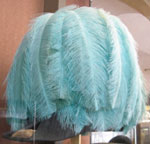Culinary Concoctions
In this section, you’ll use a dictionary to confirm the meanings of some words in excerpts from “What’s Cooking?” by Bill Bryson. When you look up each word, remember to read all the entries and look over all information. Use Merriam-Webster.com to answer the questions in this section. Use your notes to write your answers.
Going to a restaurant is generally a discouraging experience for me because I always manage somehow to antagonize the waitress. This, of course, is something you never want to do because waitresses are among the relatively small group of people who have the opportunity to sabotage items that you will shortly be putting in your mouth.
Sabotage is the act of destroying or damaging something deliberately so that it does not work correctly. A waitress, when angry with an antagonistic patron, might accidentally sneeze on that person’s food.
- What is the language of origin of sabotage?
- What word describes one who engages in sabotage? This word follows the entry for sabotage on Merriam-Webster.com.
- What definition applies in this context? The first or the second?
- What is a synonym for gravity as it is used in this passage?
- When you search for the meaning of the word expedient, you need to make a choice between an adjective or a noun. Which one will give you meaning that Bryson intended in this context?
- Which printed reference guide is usually more expedient, the glossary or the dictionary?
- Which professional would likely have more flamboyant gestures, an accountant or a conductor?
- What is a synonym for verve?
So the waitress sighs lightly and rolls her eyes a trifle, the way you would if you had to recite sixteen salad dressings over and over all day long for a succession of halfwits and reels off the list again. This time I listen with the greatest gravity and attentiveness, nodding at each, and then unfailingly, I choose one that she didn’t mention.
Gravity, defined as the “gravitational attraction of the mass of the earth, the moon, or a planet for bodies at or near its surface” is a familiar concept in science. That meaning doesn’t seem to be helpful in this context. Gravity also means “dignity or sobriety of bearing.”
When told he can’t get Thousand Island dressing on his salad, Bryson makes another choice.
I can’t possibly ask her to recite the list again, so I ask for the only one I can remember, which I am able to remember only because it sounded so awful—Gruyere and goat’s milk vinaigrette or something. Lately, I have hit on the expedient of saying: “I’ll have whichever one is pink and doesn’t smell like the bottom of a gym bag.” They can usually relate to that, I find.

Source: Photo of a panache, ChristophT, Wikimedia Commons
In fancy restaurants it is even worse because the server has to take you through the evening’s specials, which are described with a sumptuousness and panache that are seldom less than breathtaking and always incomprehensible.
One meaning of the word panache is an ornamental tuft on a helmet. In this sentence, Bryson is not referring to headgear; he’s describing the server’s attitude. The second definition “flamboyance in style or verve” highlights the difficulty with some dictionary definitions mentioned earlier. Words are defined using words we don’t know. In this case, we’ll turn this into an opportunity to look up two new words: flamboyance and verve.
- French
- saboteur
- The second
- Synonyms: Graveness, Earnestness, Intentness, Serious-Mindedness, Seriousness, Soberness, Sobriety, Solemnity, Solemness, Staidness
- noun, the article “the” signals that a noun is necessary.
- the glossary achieves the objective of providing the meaning for the word the most quickly. In print materials, the glossary is contained within the same volume. To check the meaning of a word in the dictionary, you would have to search in another volume.
- conductor
- vivacity, vitality, or enthusiasm
Bryson takes his wife to a fancy restaurant in Vermont for their anniversary. The pretentious waiter lists the specials for the night.
“Tonight,” he began with enthusiasm, “we have a crepe galette of sea chortle and kelp in a rich mal de mer sauce, seasoned with disheveled herbs grown in our own herbarium. This is baked in an inverted Prussian helmet for seventeen minutes and four seconds precisely, then layered with steamed wattle and wozzle leaves. Very delicious; very audacious. We are also offering this evening a double rack of Rio Rocho cutlets, tenderized at your table by your own flamenco dancers, then baked in a clay pit for twenty-seven minutes under a lattice of guava peel and sun-ripened stucco.

Source: Flamenco dancer, Joe Mabel, Wikimedia Commons
Bryson’s account becomes even more humorous once you analyze the pretentious waiter’s vocabulary. This special menu is a mixture of elite culinary terms and not-so-elite baloney. Your task is to sort them out. Which words are related to food and could be used in a description a fine meal? Which words are clearly not related to food? For example, “flamenco dancers” belong in the Clearly-Not-Food-Related column.
Use http://www.merriam-webster.com to help you make your choices.